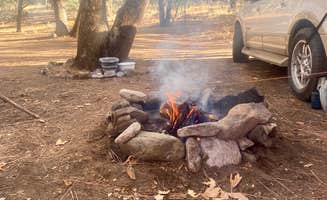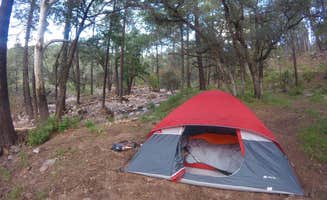Tent camping options near Douglas, Arizona include several primitive sites within Coronado National Forest, primarily concentrated in the Chiricahua Mountains. Most campgrounds require traveling unpaved forest roads that can become challenging during wet weather. Summer monsoon season transforms the landscape with flowing creeks and waterfalls, while spring and fall provide more moderate temperatures ideal for overnight stays.
What to do
Creek exploration: Sycamore Campground offers direct access to a mountain stream with hiking opportunities. As camper Cody B. notes, "The campground is situated right next to a mountain stream that is cool to explore." The stream provides natural cooling during warmer months.
Wildlife viewing: The Chiricahua Mountains host diverse wildlife including deer, wild turkeys, and various bird species. Cole M. reported at Sycamore Campground, "Saw many deer and turkeys in the area." Morning and evening hours provide optimal wildlife viewing conditions.
Waterfall hikes: West Turkey Creek Dispersed provides access to small cascades along Turkey Creek. Travis D. explains, "Turkey creek flows right next to the campground and offers fantastic hikes along its banks. There are multiple small waterfalls and pools to splash in." Waterproof footwear recommended for creek crossings.
What campers like
Solitude: The remote location of many campsites ensures quiet camping experiences even during peak seasons. Jonathan E. writes about West Turkey Creek, "This spot was quiet, isolated, beautiful, and serene. I didn't see anyone else here when I went." Most campgrounds remain uncrowded midweek year-round.
Natural water features: Several campgrounds feature creek access with small pools suitable for cooling off. At Camp Rucker, Tanner H. found "Various campsites on Rucker lake. Close waterfalls and plenty of hiking trails." Creek levels vary seasonally with highest flows during monsoon season.
Shade coverage: Many tent sites offer natural shade from mature trees. At Sycamore Campground, Cole M. noted, "Plenty of shade available," which provides relief during warmer months. Sites along creeks typically offer the most abundant tree cover.
What you should know
Road conditions: Access to most tent sites requires driving on rough forest roads. Caitlyn B. cautions about reaching Sycamore Campground, "There is a long stretch of primitive road (quite rocky) to get out the campground. We also took Apache Pass to get there and would not recommend this 'shortcut' - almost 30 minutes of primitive bumpy road." High-clearance vehicles recommended.
Water availability: Most campgrounds lack potable water. Monique R. mentions at Sycamore Campground, "Nice clean bathrooms, picnic tables, fire pit, and bear box," but campers must bring all drinking water. Seasonal creek flow cannot be relied upon for water needs.
Bear precautions: Several campgrounds provide bear boxes for food storage. At Herb Martyr Campground, Holly W. advises, "Beware skunks at night." Store all food, toiletries, and scented items properly to avoid wildlife encounters.
Tips for camping with families
Site selection: Choose established campgrounds with toilet facilities when camping with children. Cole M. notes Sycamore Campground has "pit toilets, fire rings and bear boxes," making it more suitable for families than remote dispersed sites.
Creek activities: Small children enjoy shallow creek exploration at several campsites. Tracy T. reports at West Turkey Creek, "The creek was flowing and quite a few animals at dawn and dusk," providing natural entertainment for children. Always supervise children near water.
Weather preparation: Mountain elevations experience significant temperature drops at night, even in summer. At Douglas Golf Course & RV Park, facilities include showers and toilets, providing comfort for families during extended stays. Pack warm clothing layers regardless of season.
Tips from RVers
Size limitations: Most forest roads cannot accommodate large recreational vehicles. Priscilla at Lower Juniper Flats Road warns, "Didn't really drive all the way in since a car that was coming out stated he wouldn't recommend us driving in. One way road. Decided to turn back around." RVs over 25 feet should consider staying at more accessible locations.
Dispersed options: Smaller RVs can access some dispersed sites with proper planning. Tracy T. advises about West Turkey Creek, "The drive up is beautiful, the road isn't maintained, but in pretty good condition. I stopped right after the cattle guard." Scout ahead on foot before attempting narrow forest roads with any RV.



